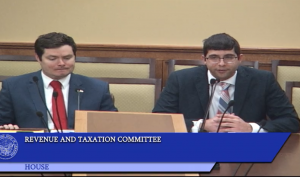By Jeremy Horpedahl, ACRE Director and UCA Associate Professor of Economics
The Arkansas General Assembly has informally adjourned, meaning that the time to pass new bills is over. They will reconvene in May to formally wrap up the session, but the major action is now concluded.
Prior to the session, ACRE put together a Top 10 List of policy ideas based on our research. And throughout the session, ACRE researchers were watching relevant bills and testifying at the Capitol in Little Rock whenever our research could help inform the debate. So how did our Top 10 List turn out?
Occupational Licensing
Major improvements were achieved in terms of interstate cooperation and lowering barriers for professionals who wish to move to Arkansas, through Act 457 of 2023. This act provides for automatic license recognition for any out-of-state license holder who moves to Arkansas, allowing them to get to work after moving here much more quickly. License holders will be granted Arkansas licenses upon moving to the state as long as they have held the license in their previous state for one year and are in good standing. The bill was weakened to some extent from its original form, changing from saying licensing boards “may” administer an Arkansas-specific exam to an out-of-state , but the final bill says that they “shall” administer the exam. This change takes away flexibility from the licensing boards and slows down what would have been a more efficient recognition process, but the reform is still good and significant overall.
Three bills this session joined Arkansas to existing licensing compacts. These compacts are a related, but distinct, concept to universal licensing recognition. Act 257 joined Arkansas to the Occupational Therapy Licensing Compact, Act 260 joined the state to the Counseling Compact, and Act 301 joined us to the Audiology and Speech Language Pathology Interstate Compact. These three acts are excellent steps towards getting more qualified healthcare and mental healthcare professionals to move to Arkansas.
In addition to these good steps forward, Arkansas also created or expanded at multiple occupational licenses, such as a new license for behavioral analysts (note: Governor Sanders recently vetoed this bill) and an expansion of the existing auctioneer license. These licenses will only add to the burden of licenses in Arkansas, and is especially worrying given that according to a recent report Arkansas already has the most occupational licenses in the nation.
Taxes and Spending
Changes to tax and spending policy can take both large and small forms. This session saw a number of small reforms pass with regard to state income taxes, but there were also some major reforms of local sales taxes.
ACRE’s big idea for tax and spending reform on our Top 10 list was a “tax and expenditure limit,” a policy that about half of US states, including all of Arkansas’s neighbors, already have. While a big change like this can take a long time to build public support – as it should for a major change – there was an important first step. Rep. Wayne Long proposed a constitutional amendment that would establish a TEL in Arkansas, which he called the Arkansas Taxpayer Bill of Rights. The legislature did not refer that amendment to the voters this year, but we are optimistic that it will start future conversations about this kind of tax and spending reform.
On state income taxes, the legislature passed another slight reduction in both personal and corporate income tax rates, lowering both by two-tenths of a percentage point (the top personal rate is now 4.7 percent). While this was a small reform, it is still important, and continues along the path that the legislature has taken in almost every session since 2015. Cumulatively, these small tax cuts have created large reductions in income taxes for middle class families of almost a thousand dollars per year.
One other major set of tax reforms was passed that will limit local sales tax increases. Through the passage of two bills this year, Arkansas both required local A&P taxes to be approved by the public (before this, no public vote was required) and set strict limits on when all local tax elections can be held. Cities, counties, and school districts will now have just two fixed dates each year (in May and November) to hold local tax elections. This reform was not on our Top 10 list, but it is one that ACRE has been working on for years. Additionally, another good corporate tax reform was enacted – repealing the throwback rule – which Arkansas has suggested for years beginning with our 2016 book on tax reform.
Government Transparency
While none of ACRE’s proposed Top 10 ideas for government transparency were passed, this doesn’t mean that we weren’t busy in this area. To the contrary, there were several bills proposed during the session which would have reduced local government transparency, and ACRE followed all of these bills, testified before the legislature multiple times, and published an op-ed explaining why these bills would reduce transparency.
Even though no bills were passed from our Top 10 list, towards the end of the session, two bills were filed that would have greatly expanded the political transparency of public meetings and the financial transparency for cities in Arkansas. Given how late the bills were filed, they didn’t end up becoming law, but we look forward to similar bills being filed in future sessions that will establish the same transparency in Arkansas cities that ACRE helped establish for Arkansas counties in 2019.
The challenges with government transparency in Arkansas were demonstrated in many ways, including several attempts to limit Arkansas’s FOIA law, which is generally regarded as among the best in the nation. ACRE’s advice to policymakers doesn’t always involve recommending new legislation, but often takes the form of preventing bad changes from happening.



